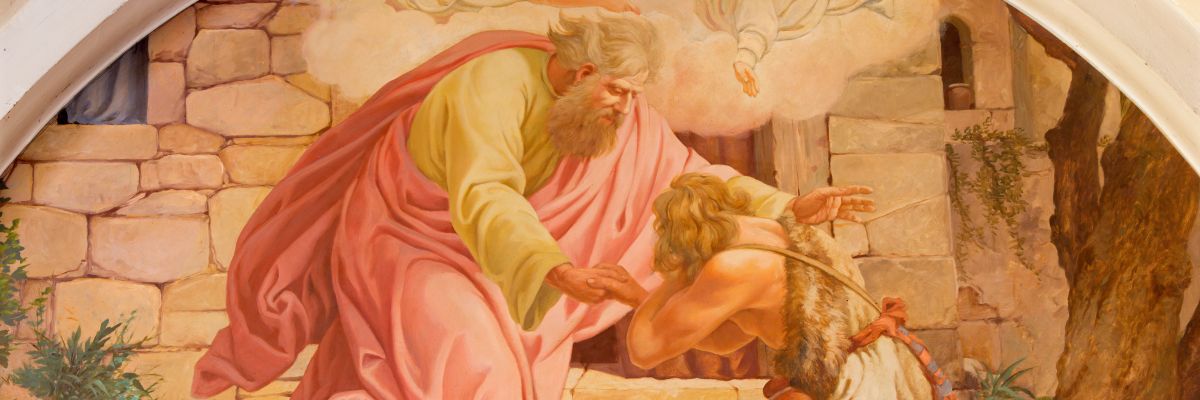
Homily for the Fourth Sunday of Advent, Year C
Tax collectors and sinners were all drawing near to listen to Jesus,
but the Pharisees and scribes began to complain, saying,
“This man welcomes sinners and eats with them.”
So to them Jesus addressed this parable:
“A man had two sons, and the younger son said to his father,
‘Father give me the share of your estate that should come to me.’So the father divided the property between them.
After a few days, the younger son collected all his belongings
and set off to a distant country
where he squandered his inheritance on a life of dissipation.
When he had freely spent everything,
a severe famine struck that country,
and he found himself in dire need.
So he hired himself out to one of the local citizens
who sent him to his farm to tend the swine.
And he longed to eat his fill of the pods on which the swine fed,
but nobody gave him any.
Coming to his senses he thought,
‘How many of my father’s hired workers
have more than enough food to eat,
but here am I, dying from hunger.
I shall get up and go to my father and I shall say to him,
“Father, I have sinned against heaven and against you.
I no longer deserve to be called your son;
treat me as you would treat one of your hired workers.”’
So he got up and went back to his father.
While he was still a long way off,
his father caught sight of him, and was filled with compassion.
He ran to his son, embraced him and kissed him.
His son said to him,
‘Father, I have sinned against heaven and against you;
I no longer deserve to be called your son.’
But his father ordered his servants,
‘Quickly bring the finest robe and put it on him;
put a ring on his finger and sandals on his feet.
Take the fattened calf and slaughter it.
Then let us celebrate with a feast,
because this son of mine was dead, and has come to life again;
he was lost, and has been found.’
Then the celebration began.
Now the older son had been out in the field
and, on his way back, as he neared the house,
he heard the sound of music and dancing.
He called one of the servants and asked what this might mean.
The servant said to him,
‘Your brother has returned
and your father has slaughtered the fattened calf
because he has him back safe and sound.’
He became angry,
and when he refused to enter the house,
his father came out and pleaded with him.
He said to his father in reply,
‘Look, all these years I served you
and not once did I disobey your orders;
yet you never gave me even a young goat to feast on with my friends.
But when your son returns
who swallowed up your property with prostitutes,
for him you slaughter the fattened calf.’
He said to him,
‘My son, you are here with me always;
everything I have is yours.
But now we must celebrate and rejoice,
because your brother was dead and has come to life again;
he was lost and has been found.’”
— Luke 15:1-3, 11-32
“It’s the oldest story in the world,” a Catholic psychiatrist once told me, referring to the formative nature of a man’s relationship with his father and his subsequent struggles in life. This parable, so exquisitely composed and so subtle in its movements, is all about this oldest story.
Now, some of us have an aversion to examining our lives in the light of our earliest experiences; we associate this undertaking with a stereotype of psychotherapy, suggesting that if we are digging into our past it must be because there is something seriously wrong with us. There is something about our relationship with our fathers that, if it seems too troubled or distant, makes us shun these facts as shameful or reflecting on ourselves.
Once I heard a talk given by a very good priest on the requisites for a good vocation to the priesthood or religious life. He used his own family as the rhetorical example, and it was a shining one: perfect father, perfect mother, and, obviously, they had a good son! After that talk, a number of those present were discussing it, and the consensus was, “Well, good luck finding these ideal families for vocations!”
One man asked, “What if you come from a family where your father was divorced or unfaithful or chronically depressed or a drinker, or what if you never knew him at all?” Another, a bit more perceptive, said wryly, “I wonder what his requirements would be for someone who was going to marry, rather than be a celibate? Adam or Eve before the Fall?” Another said, “Well, I’ve met his family and he must be blind if he doesn’t see that they’re not perfect.”
Ouch, all around.
The father in the parable we have just heard is indeed a perfect father, but this is not because he is perfect according to some human evaluation. Fatherhood is not a moral beauty contest or a sport in which one can win gold medals; it is something altogether other than what the good priest and his critics imagined.
A father may or may not be a paragon of evident virtue, he may have serious flaws, but there is one quality he must possess if he is to be a good father: he must identify himself with his sons. Their good is his good, their struggles are his struggles, their failures are his failures, their triumphs his triumphs.
In short, he is literally compassionate, meaning he is one who undergoes the experiences of the other with true empathy—with a focus and awareness of the heart of his sons, not merely a sentimental sense of drama. He is a servant of love, in thought, word, and deed: whether his love must be content with just letting things happen (letting his son take his inheritance and go far away), or taking the initiative (meeting the returning son more than halfway), or providing for his son’s needs, and celebrating his presence (the clothing, the ring, and the feasting and dancing), or correcting him and pleading for his moral improvement (as with the older son), or simply proclaiming his love. “Son you are with me always and all that I have is yours.”
Of course, this parable is principally about the Fatherhood of God, about how he loves his imperfect sons. Notice the great similarity between the older and the younger son. The younger son doesn’t expect his father to forgive him; his human shame will not allow him. He has his speech ready. He will be content to be a hired hand. The older son, in his own sense of superior entitlement, would have been content with this treatment.
The only thing the older son did differently from the one who went away to a far country is that he lacked the confidence and courage to ask the father for what he wanted. But the father is utterly determined to love them both and to forgive them both. This is the clear message of the parable.
God so loves us that he sent his only Son; indeed, he sent his Son to a far country—down to this earth, taking to himself the poverty of our human nature and experiencing its deep pains and bitter death. He literally identified himself with sinners, he took their place and gave them back their lost inheritance, and indeed gave them his own as well, and brought them back with him in his return to the Father. He did not go alone. It is not his nature.
Thus we may begin to see how the Fathers of the Church gave deep reflections on this parable as revealing the life of the Blessed Trinity. But for our purposes, in this time of repentance, we should take this parable for our meditation on our own life, our own sonship, our own fathers, and most of all on God our Father. He is determined to have us back if we stray; with each good confession— indeed with any prayer for pardon moved by love for him—he restores us as though we had never left him. And then, marvel of marvels, we may become like the Father ourselves.
Our own father may have been a prodigal son, but so are we. Let us all strive to treat each other as he has watched and waited for and welcomed us. The Son of the eternal Father teaches us that it is he who reveals the Father, and his commandment is this: “Love one another as I have loved you.”
May we who have been prodigal sons not fear to become like loving fathers to all our brothers!



